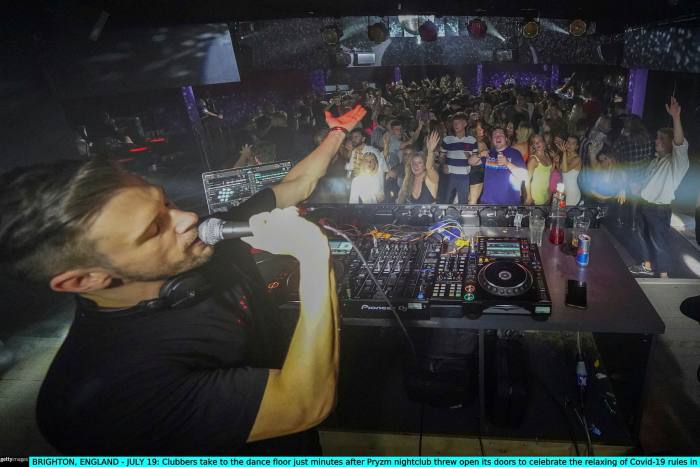[ad_1]
Boris Johnson marked England’s so-called freedom day by announcing emergency plans to exempt key workers from self-isolation rules that are causing massive economic and social disruption.
Johnson’s decision to lift most remaining Covid restrictions was also accompanied by an announcement that new rules — requiring a double-vaccination to enter a nightclub — would be introduced in September.
“Freedom day for nightclubs lasted around 17 hours,†said Michael Kill, chief executive of the Night Time Industries Association. Tory MPs criticised Johnson for announcing new Covid rules on the very day they were lifted.
The prime minister’s early optimism for the big reopening on July 19 has long since been replaced by caution and a recognition that England faces weeks of soaring cases and severe disruption.
The top US public health agency on Monday placed the UK on its highest tier for Covid-19 levels urging Americans not to visit.

Although Johnson insisted it remained the right choice to lift most legal restrictions, he acknowledged that rising case numbers — and the need for close contacts to self-isolate — was causing chaos for business.
“Everyone has been inundated with pings,†he said, referring to the NHS Covid app, and announced a list of workers — beyond hospital and social care staff — for whom self-isolation would no longer be necessary.
Johnson said “a very small number of named, fully vaccinated, critical workers†would be allowed to leave isolation to carry out their jobs. The sectors covered include “food, water, electricity, medicines, the running of our trains, the protection of our borders and the defence of the realmâ€.
Asked whether he might extend the list further, Johnson said he was reluctant to do so because of the importance of isolation in controlling the virus. “It’s one of the only shots left in our locker,†he said.
Johnson presented his briefing virtually while isolating at his Chequers residence in Buckinghamshire after coming into contact with Sajid Javid, health secretary, who tested positive for coronavirus last week.
Johnson did not rule out the possibility that rising daily case numbers — ministers expect them to hit 100,000 next month — could force a wide range of restrictions to be reintroduced.
In the case of nightclubs and other enclosed venues where large crowds gather, Johnson said a Covid passport showing proof of double-vaccination would be mandated for entry from late September.
The move was seen as an attempt to pressurise some 3m or 35 per cent of 18 to 30-year-olds who have not received a vaccination to do so, but it was criticised on several fronts.
Ministers had previously said they had no plans to introduce Covid passports and Kill said that, according to his organisation’s surveys, 80 per cent of nightclubs did not want to introduce them as they would be difficult to enforce and would discourage spontaneous visits.
David Davis, former Conservative cabinet minister, said the policy amounted to coercing people into getting vaccinated.
Alistair Carmichael for the Liberal Democrats said Covid ID cards were “unworkable, expensive and divisiveâ€. Johnson declined to say which other venues would be covered but he did not want to see “passports for pubsâ€.
The decision to open clubs now has made Johnson’s advisers nervous. “Right the way across the world we’ve seen that nightclubs and events where lots of people gather indoors are a potential for super-spreading events,†Patrick Vallance, chief scientific adviser, said.
The decision to exempt some key workers from the self-isolation regime was generally welcomed by business, but some wanted Johnson to provide more clarity or extend the list.
Helen Dickinson, chief executive of the British Retail Consortium, said: “ Retail workers and suppliers, who have played a vital role throughout this pandemic, should be included on this list, to ensure there is no disruption to the public’s ability to get food and other goods.â€
A major retailer has warned that stores may have to close because of labour shortages within a week unless the government changes the rules on people self-isolating after being “pingedâ€.Â
“The government has just not woken up in time,†said a senior executive at the business, who declined to be named. “The maths is simple and definitive because there is no way to mitigate the shortage of labour.â€
UK Hospitality said one in five staff in the sector were self-isolating but that businesses were experiencing surges with more than a third of staff missing in some areas. The number of new job vacancies in hospitality companies had increased almost 10 per cent in the past seven days, according to consulting group RSM.Â
Transport for London said two Underground lines suffered delays due to Covid-related staff absences, while one station was shut because of a shortage of staff.Â
“It’s affected my business tremendously,†said David Allen, owner of Billinghams Florist in West Bromwich in the Midlands, where one member of staff has been away on long-term sick leave and three others have had to self-isolate.Â
Additional reporting by Jonathan Eley, Delphine Strauss and Philip Georgiadis
[ad_2]
Source link







